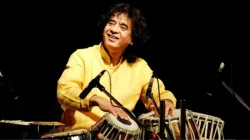Zakir Hussain dies at 73: Complete list of filmography, discography and famous soundtracks of rhythmic genius
Zakir Hussain, the legendary tabla maestro, died in a San Francisco ICU while battling serious heart issues. Hussain made time-immemorial contributions to the Indian music for which he would be idealised and remembered by many.

Zakir Hussain, the legendary tabla maestro, died in the United States' San Francisco. He was battling serious heart issues and was receiving treatment in the ICU of a hospital in San Francisco. The news was confirmed by his family and close ones. Hussain, one of the most celebrated musicians in India and around the world, earned international acclaim for his virtuosity and significant contributions to the global music scene.
A legendary musical career
Zakir Hussain’s career spanned decades, and his musical influence reached far beyond the classical tabla tradition. He became known for his mastery of rhythm, his versatility, and his innovative collaborations across a variety of genres. Hussain was born into a musical family and started his training at an early age under his father, Ustad Alla Rakha, a renowned tabla player. His musical journey began in the 1970s, with his first major collaborations marking the beginning of his global impact.
A rich and diverse discography
Zakir Hussain’s discography is a rich tapestry of rhythm and melody, showcasing his versatility as an artist. Since his early recordings in the 1970s, Hussain collaborated with a wide array of renowned musicians and artists from diverse genres. Some of his earliest works include collaborations with guitar maestro Brij Bhushan Kabra on Perfect Partnership - Guitar & Tabla (1978), and with Vasant Rai on Evening Ragas (1979). These albums established Hussain's unique ability to blend Indian classical music with other musical traditions, setting the stage for his future groundbreaking collaborations.
Throughout the 1980s, Hussain continued to evolve, producing albums like Footprints in the Sky (1981) with Rahul Sariputra and The Magic of Music (1982) with Brij Bhushan Kabra, as well as teaming up with legendary sarangi virtuoso Sultan Khan on Sur Taal (1991). His work in this period demonstrates his ability to bring together the intricate rhythms of tabla with the resonant tones of various Indian instruments, creating a harmonious fusion of classical and contemporary sounds.
Albums like Global Drum Project (2007), a collaboration with Mickey Hart, demonstrated Hussain’s global approach to music, blending rhythms and percussion from around the world. This album won a Grammy Award and cemented his reputation as a forward-thinking innovator in world music. Later albums like The Melody of Rhythm (2009), recorded with Béla Fleck and Edgar Meyer, and Good Hope (2019) with Dave Holland and Chris Potter, continued to explore musical boundaries while celebrating the roots of Indian classical traditions.
Hussain’s collaborations also include work with legendary Indian musicians such as Hariprasad Chaurasia, Ravi Shankar, and Pandit Jasraj. Notable releases include Raga Ahir Bhairav (2020) with Brij Bhushan Kabra and The Rhythm Experience (1992) with various artists. With each release, Hussain not only upheld the ancient traditions of tabla playing but also embraced new influences from jazz, world music, and even film soundtracks.
Filmography and soundtracks
Beyond his collaborations and solo albums, Zakir Hussain also significantly contributed to the world of film music. His ability to seamlessly incorporate his tabla mastery into cinematic compositions made him a sought-after musician for film scores. He contributed to several renowned Indian and international films, blending his traditional Indian rhythms with contemporary soundscapes.
Hussain’s filmography includes a variety of soundtracks that showcase his ability to adapt his style to different cinematic needs. Notably, he worked on the soundtrack for the acclaimed film In Custody (1993), composed by Hussain alongside Sultan Khan. The film’s score, with its rich textures and evocative rhythms, was a perfect fit for the narrative of the movie, which focused on the preservation of classical Indian music. Another significant contribution was to the film The Mystic Masseur (2002), for which Hussain created an atmospheric score that enhanced the film’s emotional depth.
In 2014, Zakir Hussain contributed to the soundtrack of Hazir 2, an evocative musical exploration of traditional Indian rhythms, further showcasing his deep understanding of the connection between sound and emotion. His ability to blend intricate tabla rhythms with various other instrumental sounds made him a favorite in the realm of film scores.
Soundtrack contributions and compilation albums
In addition to his direct contributions to film scores, Hussain also appeared on numerous compilations and collaborative works, such as The Rough Guide to Ravi Shankar (2003) and The Rough Guide to Indian Classical Music (2014), where his tabla mastery is featured alongside other prominent musicians from the Indian classical tradition. These compilations further solidify his position as a global ambassador for Indian classical music.
One of the standout projects of Hussain’s recent years was his collaboration with Béla Fleck and Edgar Meyer on As We Speak (2023), which blended bluegrass, jazz, and classical Indian rhythms, showcasing his ever-evolving style and his ability to bridge the gap between genres. Other notable compilations and live albums, such as Live at Shivaji Park - Bombay (1993) and Beyond the Sky (2013), continue to highlight his excellence as a performer.
An everlasting legacy
Zakir Hussain's legacy is one of deep musical innovation, cultural fusion, and unparalleled mastery. With multiple Grammy Awards and international acclaim, he helped elevate the tabla to a global stage, and his contributions to music continue to inspire musicians across the world. His blend of traditional Indian rhythms with jazz, rock, and global percussion forms left an indelible mark on the music world.
As an educator, performer, and composer, Hussain’s influence will endure for generations, cementing his status as one of the greatest tabla players of all time. Despite his passing, his vast body of work and his tireless pursuit of musical exploration ensure that his legacy will live on, inspiring both listeners and musicians across the globe.
